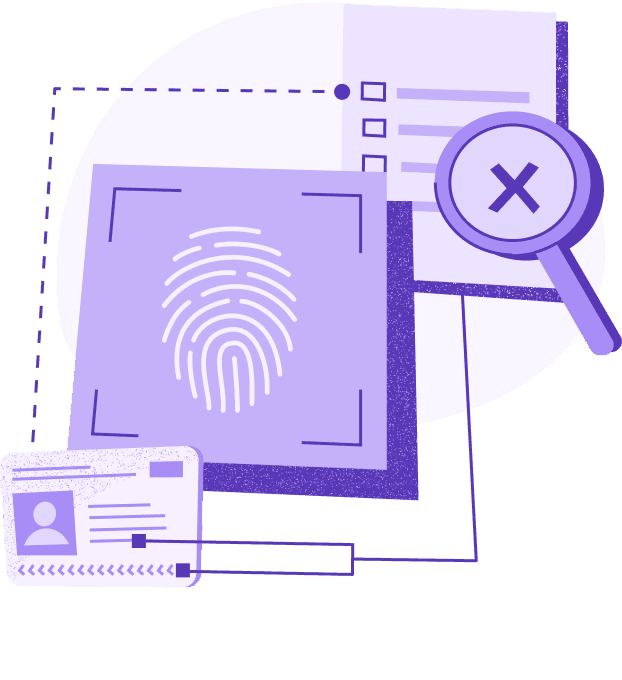Article
5 min read
A Guide to Employee Background Checks in China
Employee background checks

Author
Michał Kowalewski
Last Update
April 14, 2025

Table of Contents
What employers need to know before running background checks in China
Are background checks legal in China?
Types of background checks that are illegal in China
Common background check industries in China
Types of employee background checks in China
Background check mistakes to avoid in China
Step-by-Step guide to employee background checks in China
Run employee background checks with Deel
Key takeaways
- Background checks are widely used in finance, education, government, law enforcement, healthcare, and technology sectors to ensure the hiring of qualified professionals.
- Governed by the Labor Contract Law and the Personal Information Protection Law (PIPL), background checks require explicit consent and adherence to privacy regulations enforced by CAC and NAPSS.
- Common checks include verification of educational and employment history, criminal records, and references. Credit and medical checks require explicit consent and are restricted.
Employee background checks should be an integral part of your hiring process in China. Although not mandatory, they are a common practice, especially in sectors like finance, education, government, law enforcement, healthcare, and technology.
China is known for its large and rapidly growing workforce, with approximately 290 million workers employed in various sectors as of 2023. The tech sector is particularly booming, emphasizing the need for thorough background checks to ensure the hiring of top-tier professionals. The country offers a compelling mix of innovation and high-quality output, supported by high Mandarin proficiency, which minimizes cultural barriers and enhances communication skills
When hiring in China, it's crucial to be mindful of local employment laws, particularly regarding background checks. This highlights the importance of a thorough understanding of local practices to ensure a smooth and compliant recruitment process.
In this article, you’ll learn:
- How to run an effective and legal employment screening in China
- What are the common types of employee checks in China
- Step-by-step process of a thorough employee screening
- What mistakes to avoid when performing a background check in China
- What employers need to know before running background checks in China
What employers need to know before running background checks in China
An employee background check is the process of verifying a potential hire’s work history, education, professional qualifications, and any criminal records they might have. It’s particularly beneficial to run before finalizing an employment offer or signing a contract, ensuring the candidate meets the company's standards and requirements.
In China, employee background checks are governed by various laws and regulations, such as the Labor Contract Law and the Personal Information Protection Law (PIPL), enforced by relevant governmental bodies such as the Cyberspace Administration of China (CAC) and the National Administration for the Protection of State Secrets (NAPSS)
- Labor Contract Law: This law outlines the legal framework for labor relations, including hiring practices, and emphasizes fair treatment and privacy protection.
- PIPL: This law applies to the handling of personal information by organizations and mandates how personal information is collected, used, and disclosed. It requires employers to obtain explicit consent from individuals before conducting a background check and to provide them with specific disclosures and notices. It emphasizes the need for accuracy, relevance, and transparency in data processing.
- Cyberspace Administration of China (CAC) oversees compliance with PIPL and provides guidance on how organizations can conduct background checks while respecting individuals' privacy rights. Employers should also be mindful of regional privacy regulations, as some areas may have additional rules governing the handling of personal information.
- The National Administration for the Protection of State Secrets (NAPSS) is responsible for the protection of classified information in China. NAPSS sets guidelines and enforces regulations to prevent the leak of state secrets, which can influence the scope and depth of background checks for certain roles, particularly in government and high-security sectors.
Are background checks legal in China?
Yes, background checks are legal in China, but they are subject to strict regulations. Employers must obtain consent from the individual before conducting a background check. The consent should be explicit and informed, detailing the purpose and scope of the background check. The PIPL reinforces the requirement for explicit consent and imposes penalties for non-compliance, including hefty fines.
Employers are prohibited from conducting certain types of background checks without explicit consent, such as accessing an individual's criminal records or financial history.
Types of background checks that are illegal in China
In China, conducting background checks on potential employees is a common practice, but there are several legal restrictions and guidelines that employers must follow to comply with local laws and regulations.
- Credit Checks (restricted): Credit checks are not outright illegal but are highly restricted. Employers must obtain explicit consent from the candidate. These checks are typically only permissible for roles involving significant financial responsibilities or where handling sensitive financial information is a core duty.
- Genetic information (illegal): Employers are prohibited from inquiring about a candidate's genetic information. This includes any questions related to an individual's genetic predispositions or family medical history, as such inquiries are protected under human rights legislation.
- Arrest records (restricted): Using arrest records that did not result in a conviction as the sole basis for employment decisions is generally restricted. This is because it may disproportionately impact certain protected groups. Employers should be cautious and ensure compliance with anti-discrimination laws when considering any criminal history. Medical information (restricted): Under the Personal Information Protection Law (PIPL) and other relevant laws, employers cannot request or use medical information for hiring decisions without explicit consent, and the information must be relevant to the job.
Background checks
Common background check industries in China
In China, several key industries rely heavily on background checks to maintain integrity, security, and regulatory compliance. These industries include:
- Financial services: The financial sector in China, including banks, insurance companies, and investment firms, conducts extensive background checks. This includes credit history checks and verification of professional qualifications to assess financial trustworthiness and prevent fraud.
- Technology: In the rapidly growing technology sector, especially within major tech firms and startups, background checks are critical. These checks often focus on verifying employment history, educational credentials, and sometimes criminal records to protect proprietary information and ensure data security.
- Government and state-owned enterprises: Positions within government agencies and state-owned enterprises require thorough background checks. This can include criminal record checks and, for some roles, more comprehensive security clearances, particularly for roles involving sensitive information.
- Healthcare: The healthcare sector in China conducts rigorous background checks due to the sensitive nature of patient care. These checks often involve verifying medical licenses, educational qualifications, and criminal records to ensure that healthcare professionals meet all regulatory requirements and are trustworthy.
- Education: Educational institutions in China perform background checks to verify the credentials and suitability of candidates for teaching and administrative positions. This includes checking educational qualifications and criminal records, especially for roles involving direct interaction with students.
Types of employee background checks in China
Effective employment screening in China covers essential aspects to evaluate a candidate's abilities. Knowing these areas helps employers tailor screening processes to meet job requirements and legal standards.
| Type of Check | Common in China | Reason |
|---|---|---|
| Educational background verification | Common | Used to confirm the authenticity of a candidate’s academic qualifications and ensure they meet job requirements |
| Credit history check | Common | Generally less prevalent, though it may be used for specific roles in finance or banking |
| Employment history verification | Common | Important for verifying previous work experience and to prevent resume fraud |
| Social media screening | Common | Used to gain insights into a candidate’s character and fit for the company culture |
| Criminal record check | Less common | Conducted to ensure a candidate does not have a criminal history that could impact workplace safety |
| Financial history check | Increasingly common | Similar to credit checks but focuses more broadly on a candidate’s financial background; less common in general employment |
| Reference checks | Common | Used to gather feedback from previous employers or professional contacts to assess a candidate’s suitability |
| NAPSS security clearance | Rare | Specific to roles involving national security or sensitive information, and less common in general employment |
Background check mistakes to avoid in China
Whether you’re hiring employees or contractors in China, there are a few things you shouldn’t do as an employer when it comes to background checks:
- Non-compliance with data protection laws: Failing to adhere to the PIPL and other data protection laws can lead to severe penalties for employers.
- Conducting unauthorized checks: Employers should refrain from conducting background checks without explicit consent, especially in areas such as criminal records and financial history.
- Discriminatory practices: Using background check information to discriminate against candidates based on non-job-related factors is illegal and unethical.
- Neglecting security clearances: In industries requiring security clearances, neglecting to obtain proper clearances for employees can result in legal repercussions.
- Mishandling personal data: Recruiters should ensure that personal data collected during background checks is securely stored and protected from unauthorized access.
Step-by-Step guide to employee background checks in China
Employers looking to hire in China should follow the list of steps below to ensure legal and effective and thorough employee background checks.
-
Obtain explicit consent: Before initiating a background check, obtain explicit consent from the individual, clearly outlining the purpose and scope of the check.
-
Verify identity: Verify the candidate's identity using official identification documents such as the national identification card or passport.
-
Verify educational background: Verify the authenticity of the candidate's educational qualifications directly with the educational institutions they attended.
-
Verify employment history: Contact previous employers to verify the candidate's work experience and performance.
-
Check Criminal record: If required for the position, obtain explicit consent from the candidate and engage a certified agency to conduct a criminal record check.
-
Check credit history: Only conduct a credit history check if relevant to the position and with the candidate's explicit consent.
-
Check references: Speak with professional references provided by the candidate to gain insights into their work ethic and performance.
-
Screening social media: While not explicitly regulated, exercise caution when using social media for background checks and ensure that it does not infringe on the candidate's privacy.
-
Clear with NAPSS security: For positions in sensitive industries, apply for security clearances through the NAPSS, following their specific procedures.
-
Comply with data protection regulations: Ensure that all personal data collected during the background check process is handled in compliance with the PIPL and other relevant data protection laws.
You can also automate this process using Deel, and get a fast employee background check, with results coming in a matter of minutes.
After exploring various providers, it's clear that Deel is the best on the market. We were able to hire approximately 40 employees in the Philippines within a matter of months. Their background check process was easy and effective and made us feel safe about hiring in new markets. We're truly grateful for the opportunity to work with this team!
—Bree Cohen,
Vice President of Talent at Power Digital Marketing
Run employee background checks with Deel
There’s no need for HR to log into yet another platform or manually chase documents. With screenings in over 200 countries and territories (and counting), you can manage background checks for global employees and contractors with a single source of truth without leaving the Deel platform.
Start running fast background checks with Deel—request a demo today.

About the author
Michał Kowalewski a writer and content manager with 7+ years of experience in digital marketing. He spent most of his professional career working in startups and tech industry. He's a big proponent of remote work considering it not just a professional preference but a lifestyle that enhances productivity and fosters a flexible work environment. He enjoys tackling topics of venture capital, equity, and startup finance.
















